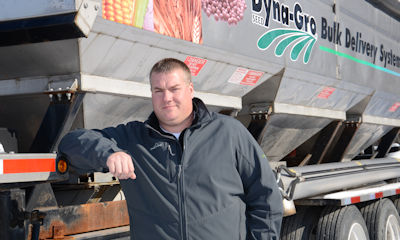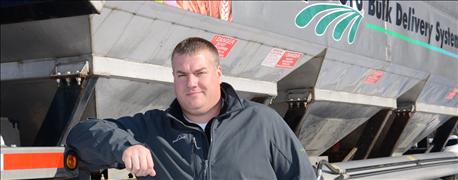
About 40% to 50% of all soybean seed delivered by Crop Productions Services in the northern and southeast Indiana region this year will be true bulk delivery. Kevin Adams, seed manager for the region and an Indiana Certified Crops Adviser, says bulk delivery makes sense for both seed companies and farmers.
“We pick up efficiencies by delivering seed in bulk tenders pulled by semi-tractors,” he says. There are six tenders available in his CPS territory. Tenders have three compartments, each holding about 250 units. A separate engine runs the hydraulics.

BULK TO GO: Kevin Adams stands by one of the CPS seed tenders that will be on the road delivering bulk soybean seed.
“Going true bulk allows us to deliver lots of seed quickly and efficiently,” Adams says. Some customers purchase stand-alone storage containers that hold up to 300 units, he adds. Drivers fill those units directly from the tender. Customers with seed wagons that allow them to load seed into the wagon with an auger or belt find these 300-unit storage units particularly helpful, he adds.
Bulk bags that usually hold 40 units or plastic boxes that hold roughly the same amount, while much more convenient that 50-pound bags, aren’t as efficient as true bulk, Adams says. “We still have to fill and refill them,” he says. Each plastic box can cost up to $500 new.
One thing throttling the shift to true bulk is that several customers still use seed tenders fitted for plastic boxes to get seed to the planter. Those customers still require plastic boxes, he says.
One advantage of true bulk is less handling of the seed, Adams notes. Every time seed is handled there’s some chance for damage, even if it’s relatively minor.
The bulk tender pictured here is equipped with poly-cupped auger flighting. It’s gentler on seed than regular metal flighting. Adams shies away from brush-tipped augers because after they wear, bristles become sharp and can damage seed.
Their newest tenders have belts for moving seed instead of augers. “They are even gentler on seed,” he concludes.
About the Author(s)
You May Also Like




